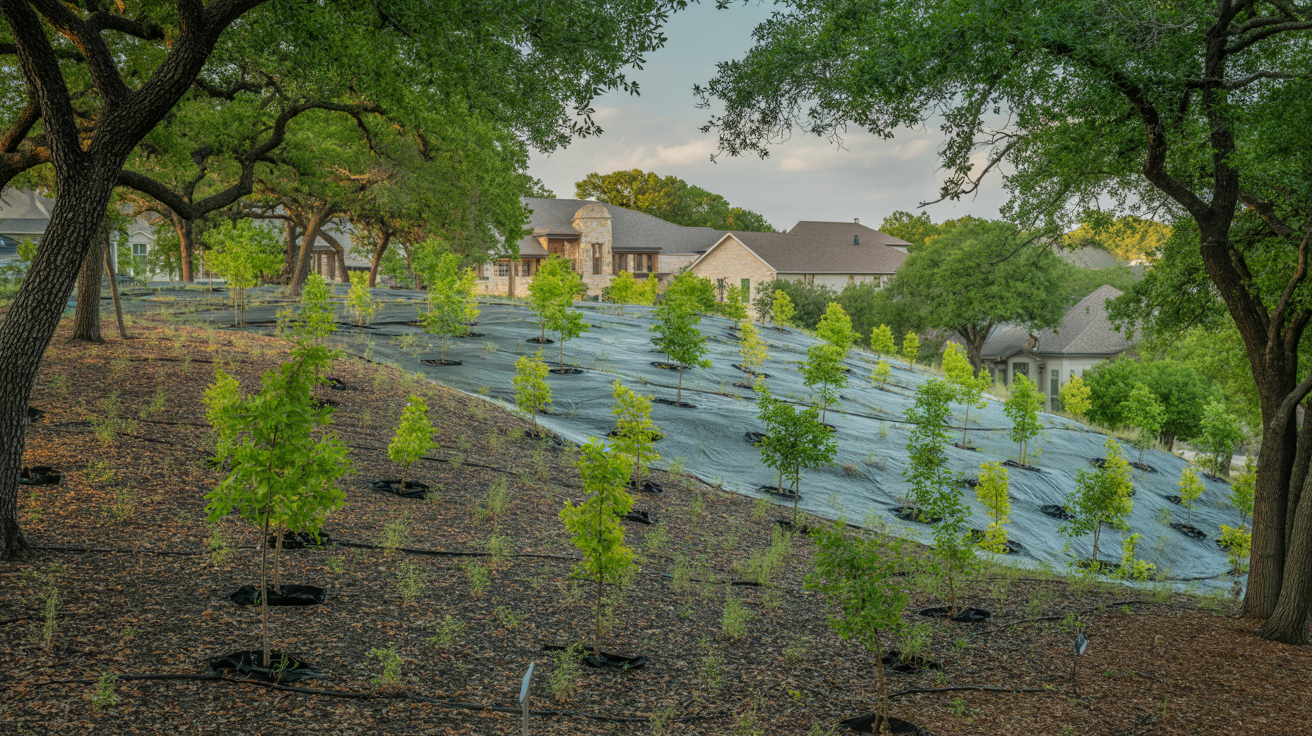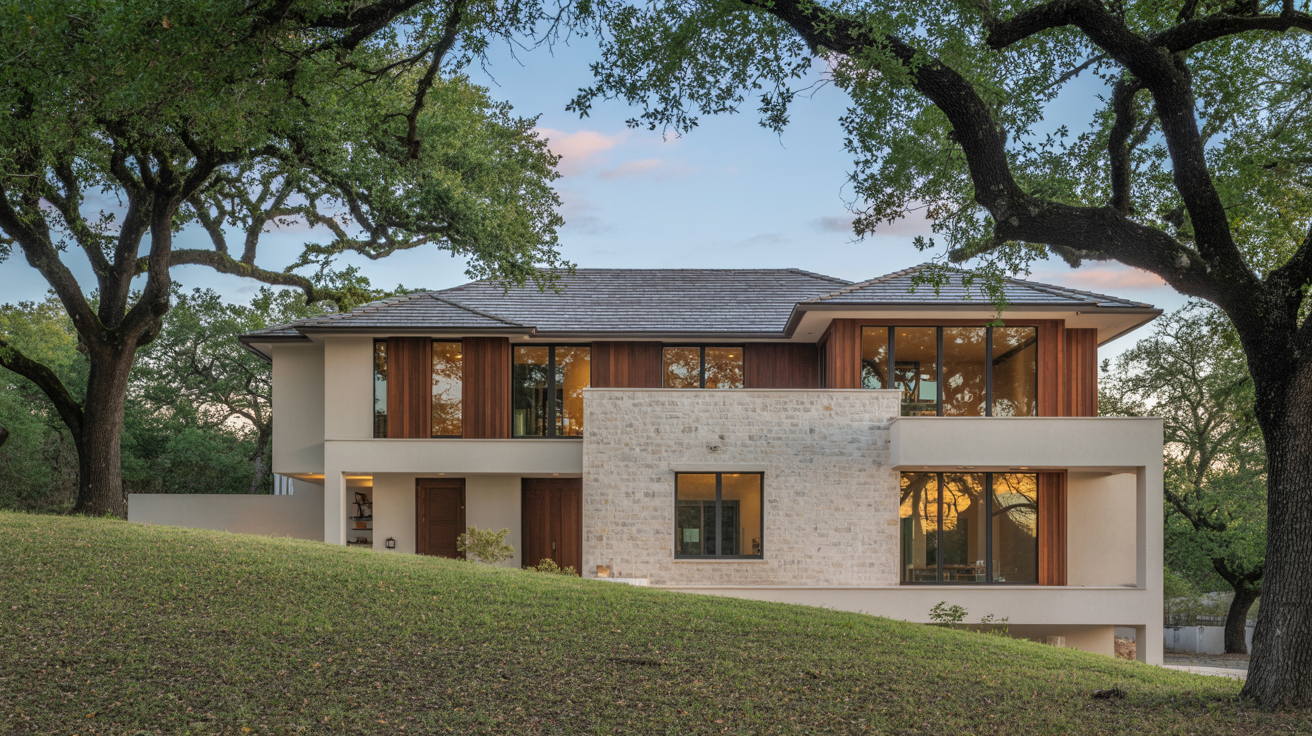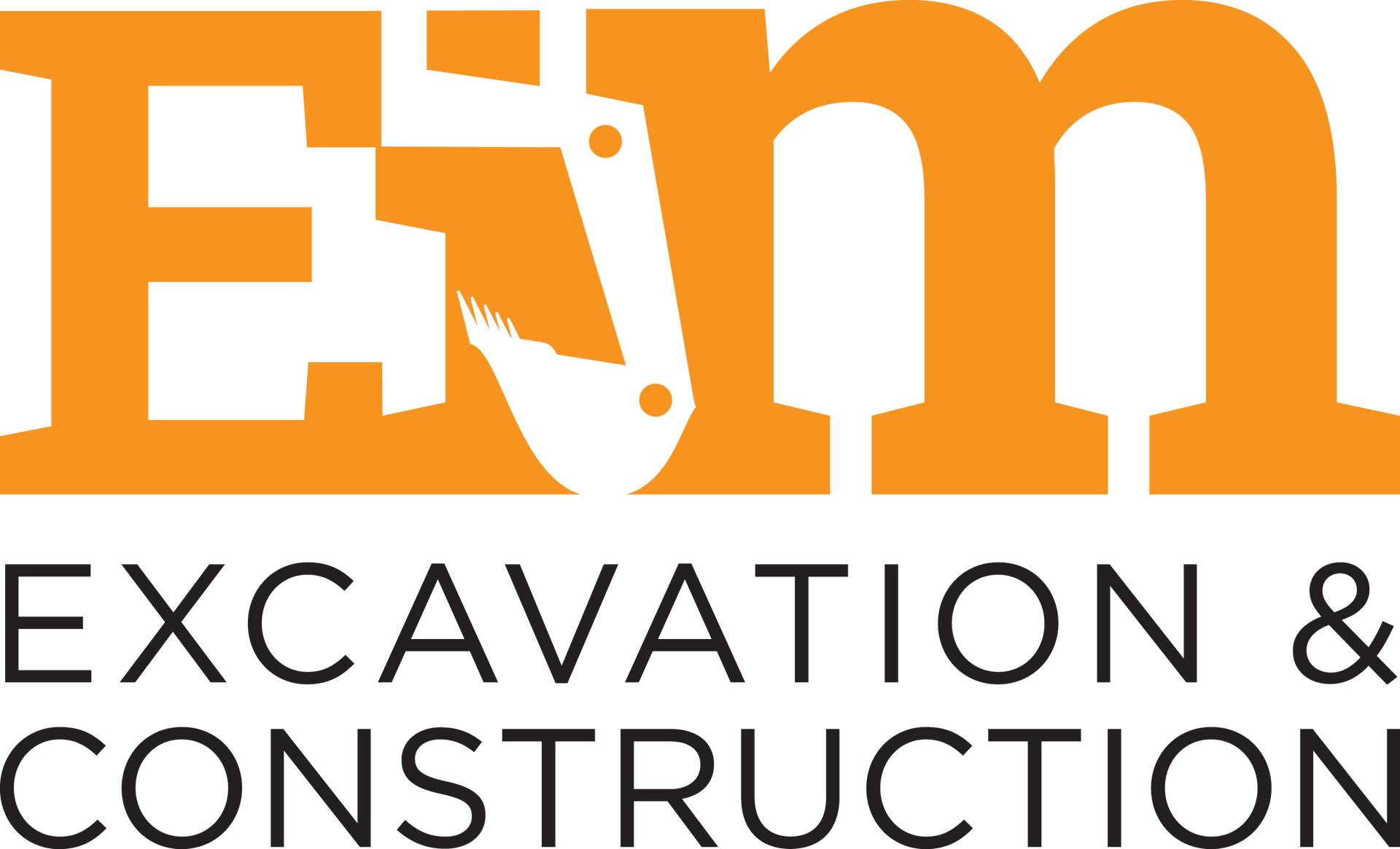Professional Landscaper vs Yard Worker: Key Differences
What Makes a Professional Landscaper Different from Your Average Yard Worker
When you're looking for a professional landscaper, you're not just hiring someone to mow your grass or trim your hedges. After twenty years in construction and nearly two decades running Earth in Motion, I've learned that the difference between a true professional and someone who just owns a lawnmower goes far deeper than most people realize. A real professional landscaper brings together technical expertise, design vision, and project management skills to transform your outdoor space into something truly special.
In my years working across Texas and Colorado, I've seen countless homeowners make the mistake of thinking all landscaping services are the same. They'll hire the cheapest option, only to end up with dead plants, drainage problems, or hardscaping that falls apart after one winter. The truth is, professional landscaping is a skilled trade that requires extensive knowledge of horticulture, soil science, irrigation systems, and construction techniques.
Let me share what I've discovered makes the difference between a professional landscaper and someone who's just trying to make a quick buck in your yard.
The Technical Skills That Separate Professional Landscapers from Amateurs
During my military service and construction career, I learned that expertise comes from understanding systems, not just individual components. The same principle applies to professional landscaping. A qualified professional landscaper needs to master multiple technical disciplines that work together to create successful outdoor environments.
Plant Knowledge Goes Beyond Pretty Pictures
When I started Earth in Motion back in 2005, I quickly realized that knowing plants means understanding their entire lifecycle. A professional landscaper doesn't just pick plants because they look good in a catalog. We consider factors like:
- Mature size and growth patterns - That cute little tree will eventually need 30 feet of clearance
- Water requirements and drought tolerance - Especially critical here in Texas where water conservation matters
- Soil pH preferences and nutrient needs - Austin's clay soil requires different approaches than Colorado's mountain conditions
- Seasonal changes and maintenance requirements - Your landscape should look good year-round, not just in spring
I remember working on a project in Colorado where the homeowner wanted tropical plants because they'd seen them in a magazine. A professional landscaper's job is to educate clients about what will actually thrive in their specific environment, not just take their money and plant what they ask for.
Understanding Irrigation and Water Management
Water management separates professional landscapers from weekend warriors more than any other factor. In Texas, we deal with everything from flash floods to extended drought periods, sometimes in the same month. Professional irrigation design requires understanding:
- Soil drainage patterns and water retention
- Proper sprinkler head selection and placement
- Smart controller programming for seasonal adjustments
- Drip irrigation for water-sensitive plants
- Drainage solutions to prevent water damage
I've built custom pond systems that incorporate natural drainage patterns, turning potential flooding problems into beautiful water features. That's the kind of problem-solving approach a professional landscaper brings to every project.
Design Vision and Project Planning Skills
My construction background taught me that every successful project starts with proper planning. A professional landscaper approaches your outdoor space the same way an architect approaches a building - with a comprehensive vision that considers how all elements work together.
Creating Layered Landscapes That Tell a Story
Professional landscape design isn't about randomly placing plants around your yard. It's about creating layers of height, texture, and color that guide the eye and create focal points. When I design a landscape, I think about:
- Canopy trees that provide structure and shade
- Understory plantings that fill middle spaces
- Ground cover and accent plants for detail work
- Seasonal interest from flowering and foliage plants
- Hardscaping elements that provide year-round structure
The goal is to create outdoor spaces that look intentional and well-established, even when newly planted. This requires understanding how plants will look together as they mature, not just how they appear on installation day.
Integrating Hardscaping for Function and Beauty
My specialty in custom pond construction has taught me how important it is to blend hardscaping with plantings seamlessly. A professional landscaper knows that pathways, retaining walls, and water features aren't just decorative elements - they're functional components that need to work with your home's architecture and the natural flow of your property.
I've worked on projects where previous contractors had installed beautiful stonework that looked completely out of place because they didn't consider the overall design context. Professional landscaping means every element serves both aesthetic and practical purposes.
Business Expertise and Project Management
Running Earth in Motion as a certified Service-Disabled Veteran-Owned Small Business has taught me that being a professional landscaper requires strong business skills alongside technical expertise. Your landscaping investment deserves a professional who can manage projects efficiently and communicate clearly throughout the process.
Understanding Regulations and Best Practices
Professional landscapers stay current with local regulations, water restrictions, and industry best practices. In Austin, this means understanding:
- Water conservation requirements and rebate programs
- Native plant preferences and invasive species restrictions
- Proper permitting for hardscaping and drainage work
- Safety standards for irrigation and electrical installations
Many communities now require certified professionals for certain types of landscaping work, especially projects involving irrigation systems or significant grading changes. This trend reflects the growing recognition that landscaping is a skilled profession requiring specialized knowledge.
Long-term Maintenance Planning
A professional landscaper designs with maintenance in mind. During my years in construction, I learned that the best projects are built to last with minimal ongoing issues. The same principle applies to landscaping - professional installation should reduce your long-term maintenance burden, not create more work.
When I plan a landscape, I consider factors like:
- Plant spacing that prevents overcrowding as specimens mature
- Irrigation coverage that can be easily adjusted or repaired
- Access paths for future maintenance and equipment
- Seasonal care requirements that fit the client's lifestyle
How Professional Landscapers Add Value to Your Property
Over the years, I've seen how quality landscaping transforms not just the appearance of a property, but the entire way families use their outdoor spaces. A professional landscaper creates value that goes beyond the immediate visual impact.
Solving Practical Problems While Enhancing Beauty
Every property has challenges - poor drainage, difficult slopes, areas that won't grow grass, or spaces that feel disconnected from the house. A professional landscaper sees these challenges as opportunities to create unique solutions.
I remember one Austin project where the backyard had a steep slope that caused erosion problems every time it rained. Instead of just installing basic erosion control, we created a terraced garden with natural stone retaining walls and drought-tolerant plantings. The solution eliminated the drainage problem while creating the most beautiful part of their landscape.
Creating Outdoor Spaces That Extend Your Living Area
Professional landscape design thinks about how you actually use your outdoor spaces. A professional landscaper doesn't just make your yard look pretty - we create functional outdoor rooms that become extensions of your home.
This might involve designing entertainment areas with appropriate lighting and seating, creating privacy screens from busy streets, or establishing quiet retreat spaces where you can relax after a long day. The key is understanding your family's lifestyle and designing landscapes that support how you want to live.
Questions You Should Ask Any Professional Landscaper
My experience both as a business owner and as someone who's worked with countless contractors over the years has taught me what questions really matter when evaluating landscape professionals.
Technical Expertise and Experience
Don't be afraid to ask detailed questions about a landscaper's technical knowledge. A true professional will be happy to explain their approach and educate you about the process. Key questions include:
- "How do you approach plant selection for our specific site conditions?"
- "What's your process for designing irrigation coverage?"
- "How do you handle drainage and grading issues?"
- "Can you provide references for similar projects in our area?"
A professional landscaper should be able to discuss these topics in detail and show examples of previous work that demonstrates their expertise.
Project Planning and Communication
Successful landscaping projects require clear communication and realistic planning. Ask potential contractors about:
- Their design process and how they incorporate your input
- Timeline expectations and how they handle weather delays
- What's included in their proposals and what might cost extra
- How they handle changes or problems during construction
Professional landscapers should be able to walk you through their entire process and explain how they'll keep you informed throughout the project.
Why Certification and Continuing Education Matter
The landscaping industry has evolved significantly since I started Earth in Motion. Today's professional landscapers pursue certifications and continuing education to stay current with best practices, new technologies, and environmental regulations.
Look for professionals who invest in their education through industry associations and certification programs. This commitment to learning indicates that they take their profession seriously and want to provide the best possible service to their clients.
Water-efficient landscaping certifications are particularly valuable in Texas, where drought conditions and water restrictions are ongoing concerns. Professional landscapers with these credentials can help you create beautiful landscapes that thrive even during dry periods.
The Investment Value of Working with a Professional Landscaper
People often ask me about the cost difference between hiring a professional landscaper versus trying to do the work themselves or hiring the cheapest option they can find. While I can't give you specific dollar amounts, I can explain the factors that influence landscaping investments and why professional expertise typically provides better long-term value.
Factors That Influence Landscaping Costs
Several key factors determine the investment required for professional landscaping:
- Site conditions - Slopes, poor soil, and drainage issues require more extensive preparation
- Project scope and complexity - Simple plantings cost less than integrated hardscaping and water features
- Material selection - Native plants and sustainable materials may cost more initially but provide better long-term value
- Access and logistics - Difficult-to-reach areas require more time and specialized equipment
- Seasonal timing - Some times of year are better for certain types of work
Why Professional Installation Saves Money Long-term
My construction experience has shown me that cutting corners during installation always costs more in the long run. Professional landscapers prevent expensive problems by:
- Proper soil preparation that ensures plant health
- Correct irrigation design that prevents water waste and plant stress
- Quality hardscaping installation that won't shift or crack
- Appropriate plant selection that thrives in your specific conditions
I've seen too many homeowners spend thousands trying to fix problems that could have been avoided with proper professional installation from the beginning.
Building Long-term Partnerships with Professional Landscapers
The best landscaping relationships are partnerships that develop over time. A professional landscaper who understands your property, your family's needs, and your long-term goals can help you develop your outdoor spaces in phases that make financial sense.
At Earth in Motion, I work with clients to create master plans that can be implemented over several years. This approach allows homeowners to spread the investment over time while ensuring that each phase builds toward a cohesive final result.
Think about your landscape as a living, evolving space that will change and mature over the years. A professional landscaper can help you plan for this growth and make adjustments as your needs change.
The Future of Professional Landscaping
As environmental concerns and water conservation become increasingly important, professional landscapers are adapting to meet new challenges. We're incorporating more sustainable practices, using smart irrigation technologies, and focusing on native plant communities that support local ecosystems.
The profession continues to evolve, requiring ongoing education and adaptation. Professional landscapers who stay current with these trends can help you create outdoor spaces that are not only beautiful but also environmentally responsible.
Whether you're planning a complete landscape renovation or just looking to solve specific problems in your yard, working with a qualified professional landscaper ensures that your investment will provide lasting beauty and functionality for years to come.
Frequently Asked Questions About Professional Landscaping Services
What qualifications and experience does Earth in Motion bring to landscaping projects?
As the owner of Earth in Motion, I bring over twenty years of construction experience and nearly two decades running our certified Service-Disabled Veteran-Owned Small Business. My background includes military service and extensive construction work, which gives me a unique perspective on project management and technical problem-solving. I specialize in custom pond construction and have worked across Texas and Colorado, dealing with diverse environmental conditions from Austin's clay soil to Colorado's mountain terrain. This experience allows me to understand complex site challenges and create solutions that work long-term. I stay current with industry certifications and water-efficient landscaping practices, which is particularly important here in Texas where drought conditions and water restrictions are ongoing concerns.
What services does Earth in Motion offer beyond basic landscaping?
At Earth in Motion, we provide comprehensive landscaping solutions that go far beyond basic lawn care. My specialty includes custom pond construction and water feature installation, where I can turn drainage problems into beautiful focal points for your property. We handle complete landscape design and installation, including plant selection based on your specific site conditions, professional irrigation system design and installation, and hardscaping integration with natural stone and other materials. I also provide drainage solutions, soil preparation, and terraced gardens for challenging slopes. Our approach integrates all these elements into cohesive outdoor spaces that function as extensions of your home, whether you need entertainment areas, privacy screening, or quiet retreat spaces.
How do you determine the cost factors for a landscaping project?
Several key factors influence the investment required for your landscaping project. Site conditions play a major role - properties with slopes, poor drainage, or challenging soil conditions like Austin's clay require more extensive preparation work. Project scope and complexity matter significantly, as simple plantings require less investment than integrated hardscaping and custom water features. Material selection affects costs, where native plants and sustainable materials may require more initial investment but provide better long-term value and lower maintenance. Access and logistics also impact the project, as difficult-to-reach areas need more time and specialized equipment. Seasonal timing can influence efficiency, as certain times of year are better for specific types of work. I always focus on creating solutions that provide lasting value rather than just initial appearance.
How long do landscaping projects take and what's the installation process?
Project timelines depend on scope and complexity, but I always start with a comprehensive design process that incorporates your input and site analysis. Simple landscape installations might take a few days, while complete transformations with custom pond construction and extensive hardscaping can take several weeks. Weather conditions, especially here in Texas, can affect timing, and I build realistic expectations into every project schedule. My construction background helps me manage projects efficiently, breaking work into logical phases that minimize disruption to your daily routine. I also offer master planning services where we can implement your landscape vision in phases over time, allowing you to spread the investment while ensuring each phase builds toward the final cohesive result. Throughout the process, I maintain clear communication about progress and any adjustments needed.
What makes Earth in Motion's approach different from other landscaping services?
My unique combination of military service, construction expertise, and nearly twenty years running Earth in Motion gives me a systems-thinking approach that most landscapers lack. Instead of just making your yard look pretty, I solve practical problems while enhancing beauty. For example, I've transformed steep slopes that caused erosion issues in Austin into terraced gardens with natural stone retaining walls, eliminating drainage problems while creating the most beautiful part of the landscape. My specialty in custom pond construction allows me to incorporate natural drainage patterns into water features, turning potential flooding problems into stunning focal points. I design with long-term maintenance in mind, considering factors like mature plant spacing, irrigation accessibility, and seasonal care requirements that fit your lifestyle. This approach creates landscapes that reduce your maintenance burden over time rather than creating more work.



